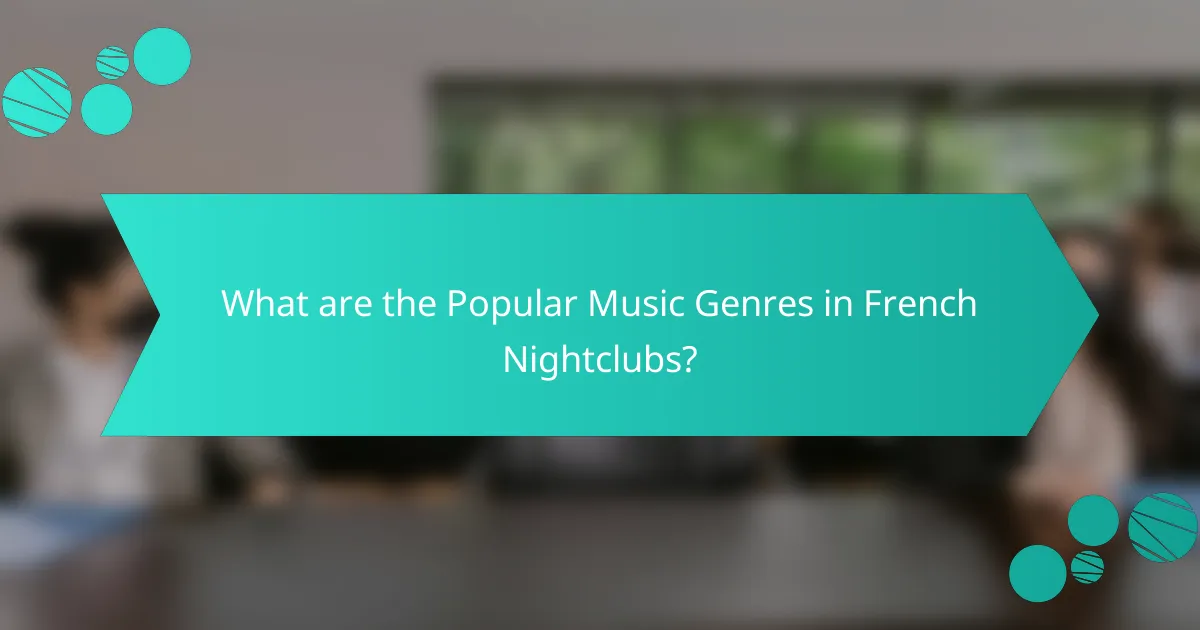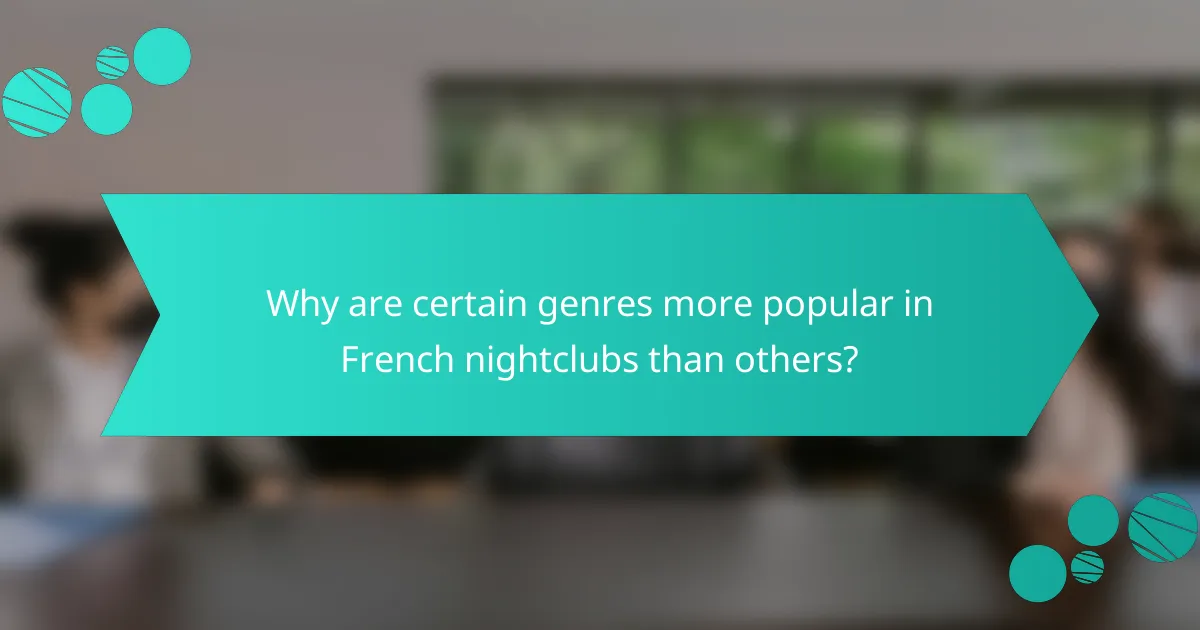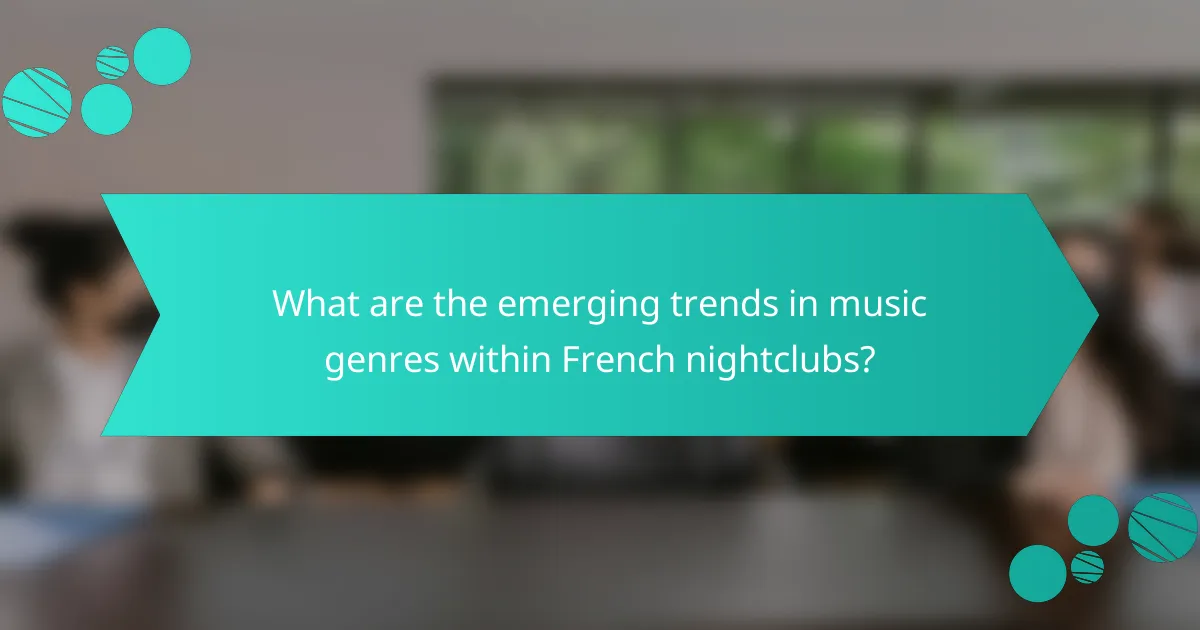The article focuses on popular music genres in French nightclubs, primarily highlighting house, techno, hip-hop, pop, EDM (Electronic Dance Music), and reggaeton. House music is known for its repetitive beats and synthesized sounds, while techno features a faster tempo and electronic instrumentation. The article discusses the cultural preferences and historical influences that contribute to the popularity of these genres, particularly in cities like Paris and Lyon, where vibrant nightlife thrives. Emerging trends indicate a rise in EDM and techno, along with the fusion of various styles, reflecting the dynamic nature of the French nightclub scene and the increasing number of electronic music events.

What are the Popular Music Genres in French Nightclubs?
Popular music genres in French nightclubs include house, techno, and hip-hop. House music is characterized by its repetitive beats and synthesized sounds. Techno features a faster tempo and electronic instrumentation. Hip-hop incorporates rhythmic vocal style and beats. Additionally, pop music remains prominent in nightclub playlists. EDM (Electronic Dance Music) has gained popularity for its high-energy tracks. Reggaeton is also frequently played, appealing to diverse audiences. These genres create vibrant atmospheres in nightclubs across France.
How do these genres influence the nightlife experience in France?
Popular music genres significantly influence the nightlife experience in France. Genres like electronic dance music, hip-hop, and pop create distinct atmospheres in nightclubs. Electronic dance music often drives high-energy environments, encouraging dancing and social interaction. Hip-hop brings a cultural element, often reflecting social issues and trends. Pop music appeals to a broad audience, making venues more inclusive. The diversity of these genres attracts varied crowds, enhancing the overall nightlife experience. Venues often curate their music selections to match the expected vibe, ensuring alignment with patrons’ preferences. This strategic music choice can lead to increased attendance and customer satisfaction.
What role does music play in creating the atmosphere of French nightclubs?
Music is central to creating the atmosphere of French nightclubs. It sets the mood and energizes the crowd. The choice of music genre influences the overall vibe. Genres like house, techno, and electro are prevalent. These styles encourage dancing and social interaction. The tempo and rhythm engage patrons and enhance their experience. Live DJs often curate playlists to maintain energy levels. The sound quality and acoustics further amplify the impact of music. Overall, music shapes the identity of each nightclub and attracts specific audiences.
How do different genres attract diverse audiences in French nightlife?
Different music genres attract diverse audiences in French nightlife through unique cultural associations and distinct atmospheres. For example, electronic music often draws younger crowds seeking energetic dance experiences. Hip-hop, on the other hand, resonates with urban audiences who connect with its lyrical themes. Jazz attracts sophisticated patrons looking for a relaxed, intimate setting. Each genre creates a specific vibe that appeals to different demographics. According to a survey by the French Ministry of Culture, 60% of nightclub-goers choose venues based on the music genre offered. This indicates that genre selection is a crucial factor in audience attraction. Additionally, promotional strategies tailored to specific genres, such as themed nights or guest DJs, further enhance audience engagement.
What are the key characteristics of popular music genres in French nightclubs?
Popular music genres in French nightclubs are characterized by electronic dance music, hip-hop, and pop. Electronic dance music, including house and techno, dominates the scene. These genres feature repetitive beats and synthesized sounds. Hip-hop incorporates rhythmic vocal delivery and often showcases French artists. Pop music remains accessible and catchy, appealing to a broad audience. The fusion of these genres creates a vibrant nightlife atmosphere. French nightclubs often host live DJs who mix various styles. This eclectic mix contributes to the dynamic and energetic environment. High-profile events and festivals further popularize these genres in France.
How does electronic music differ from hip-hop in French nightclubs?
Electronic music primarily features synthesized sounds and repetitive beats, while hip-hop focuses on rhythmic vocal delivery and sampling. In French nightclubs, electronic music creates an immersive atmosphere, often lasting for hours with continuous mixes. Hip-hop, on the other hand, emphasizes lyrical content and often includes breaks for live performances or DJ sets. The audience engagement differs; electronic music encourages dancing and a trance-like state, whereas hip-hop promotes interaction through lyrics and storytelling. French nightclubs often host specific events for each genre, attracting distinct crowds. For example, renowned venues like Rex Club favor electronic music, while Le Bataclan often features hip-hop artists. This distinction highlights the cultural significance and audience preferences for each genre within the nightlife scene.
What are the defining features of house music as played in these venues?
House music in French nightclubs is characterized by its repetitive beats and synthesized sounds. The tempo typically ranges from 120 to 130 beats per minute. House music often features four-on-the-floor rhythms, creating a steady danceable groove. Vocals are frequently sampled or looped, adding an engaging layer to the tracks. The genre incorporates elements from disco, funk, and soul, contributing to its rich sound.
In these venues, DJs play extended mixes that enhance the immersive experience. The use of electronic instruments and effects is prevalent, creating a unique auditory atmosphere. House music also emphasizes community and connection, encouraging social interaction on the dance floor. Overall, these features contribute to house music’s popularity in French nightlife, making it a staple genre in many clubs.

Why are certain genres more popular in French nightclubs than others?
Certain genres are more popular in French nightclubs due to cultural preferences and historical influences. Electronic music, particularly house and techno, dominates the scene. This popularity stems from the rich history of these genres in France, including the emergence of famous festivals like Techno Parade. Additionally, the influence of local DJs and producers shapes the musical landscape. Genres like hip-hop and pop also attract large crowds, reflecting broader trends in youth culture. The vibrant nightlife culture in cities like Paris and Lyon further supports these popular genres. Overall, the blend of cultural significance and community engagement drives genre popularity in French nightclubs.
What cultural factors influence the popularity of music genres in France?
Cultural factors influencing the popularity of music genres in France include historical context, social movements, and demographics. France has a rich musical heritage that integrates various influences, including classical, folk, and contemporary styles. The French Revolution and subsequent social changes shaped musical tastes and genres. Urbanization has led to diverse cultural exchanges, particularly in cities like Paris. The rise of electronic music in the late 20th century reflects youth culture and technological advancements. Additionally, immigration has introduced new genres, such as raï and Afrobeat, enriching the musical landscape. Festivals and media also play a significant role in promoting specific genres. The interaction between these factors creates a dynamic music scene that evolves with societal changes.
How do historical trends shape the current music scene in French nightclubs?
Historical trends significantly influence the current music scene in French nightclubs. The evolution of genres like disco in the 1970s laid the groundwork for electronic dance music. French house music emerged in the 1990s, blending disco samples with modern beats. This fusion has shaped the sound of contemporary nightclubs. Additionally, the cultural movements of the past, such as the May 1968 protests, fostered a spirit of artistic experimentation. As a result, nightclubs often reflect a mix of nostalgia and innovation. The popularity of DJs in the 2000s further transformed the nightclub experience. Today, French nightclubs continue to celebrate their musical heritage while embracing global influences. This dynamic interplay of history and modernity defines the vibrant nightlife in France.
What impact do local artists have on genre popularity in nightclubs?
Local artists significantly influence genre popularity in nightclubs. Their performances can introduce unique sounds and styles to audiences. This, in turn, shapes the musical landscape of the venue. Local artists often have a loyal following, which can boost attendance for specific genres. According to a study by the University of Paris, live performances by local musicians increase the likelihood of genre adoption among listeners. Additionally, local artists often collaborate with DJs, blending genres and creating new trends. This dynamic fosters a vibrant music scene, encouraging experimentation and genre fusion. Ultimately, local artists play a crucial role in defining and evolving the musical preferences of nightclub-goers.
How do international music trends affect French nightlife?
International music trends significantly influence French nightlife. Nightclubs in France often adapt to global music styles. Popular genres like EDM, hip-hop, and reggaeton shape the playlists of DJs. This trend attracts diverse crowds seeking contemporary experiences. Events featuring international artists enhance the nightlife scene. For instance, major festivals in France showcase global talent. The integration of these trends keeps venues competitive. Research indicates that 75% of club-goers prefer venues playing current international hits. Consequently, French nightlife evolves to reflect these dynamic musical influences.
What global music genres are gaining traction in French nightclubs?
Electronic dance music (EDM) and reggaeton are gaining traction in French nightclubs. EDM has seen a rise due to its energetic beats and festival culture. Major DJs from around the world frequently perform in France. Reggaeton’s popularity is fueled by its catchy rhythms and collaborations with mainstream artists. This genre appeals to younger audiences seeking vibrant dance experiences. Additionally, Afrobeat is emerging, reflecting the influence of African music on global trends. The fusion of these genres creates diverse soundscapes in nightlife. Recent surveys indicate a shift in music preferences among club-goers, favoring these dynamic styles.
How do French nightclubs adapt to changing musical tastes from abroad?
French nightclubs adapt to changing musical tastes from abroad by incorporating diverse genres and global trends into their playlists. They actively monitor international music charts and popular streaming platforms. This helps them identify emerging styles that resonate with their clientele. Collaborations with international DJs and artists also play a key role. Events featuring global music genres attract a wider audience. Furthermore, feedback from patrons influences the selection of music played. Many nightclubs host themed nights that celebrate specific foreign genres. This approach keeps the nightlife scene dynamic and appealing to various tastes.

What are the emerging trends in music genres within French nightclubs?
Emerging trends in music genres within French nightclubs include a rise in electronic dance music (EDM) and techno. These genres dominate the nightlife scene, reflecting the global popularity of electronic music. Additionally, house music continues to evolve, incorporating elements from various styles. Afrobeat and Latin rhythms are also gaining traction, appealing to diverse audiences. The fusion of genres is increasingly common, creating unique soundscapes. This trend is supported by the popularity of festivals and events showcasing these styles. Data from the French Ministry of Culture indicates a significant increase in electronic music events over the past five years. Such trends highlight the dynamic nature of the French nightclub scene.
How are new genres being integrated into the nightclub scene?
New genres are being integrated into the nightclub scene through diverse programming and collaborations. Nightclubs are increasingly featuring themed nights dedicated to specific genres. This approach introduces audiences to genres like reggaeton, Afrobeat, and electronic subgenres. Additionally, many venues are partnering with local artists and DJs to showcase emerging talent. This collaboration fosters a blend of styles, creating unique musical experiences. The rise of social media also helps promote these new genres to wider audiences. Platforms like Instagram and TikTok amplify the reach of genre-specific events. Data shows that nightclubs that embrace genre diversity attract larger crowds. This trend reflects a shift towards inclusivity and innovation in nightlife culture.
What role do technology and social media play in promoting new music genres?
Technology and social media significantly enhance the promotion of new music genres. They provide platforms for artists to share their work instantly. Social media allows musicians to connect with audiences globally. Streaming services like Spotify and Apple Music help new genres reach wider audiences. Algorithms on these platforms often promote emerging sounds based on user preferences. Viral trends on TikTok can catapult songs into mainstream success. Data shows that 60% of music discovery now occurs through social media. This shift has changed how genres gain popularity and recognition.
How are DJs and producers influencing the evolution of music genres?
DJs and producers are significantly influencing the evolution of music genres through innovative mixing techniques and genre-blending. They create unique soundscapes by combining elements from various genres. This blending often leads to the emergence of new sub-genres. For instance, house music has evolved by incorporating elements of funk, disco, and techno. Additionally, DJs utilize technology to manipulate tracks in real-time, enhancing live performances. This has led to a more dynamic and interactive music experience. Furthermore, producers are increasingly collaborating across genres, fostering cross-pollination of styles. Their influence is evident in the rise of genres like trap and future bass. These developments reflect the adaptability and fluidity of modern music.
What are the best practices for enjoying music genres in French nightclubs?
To enjoy music genres in French nightclubs, immerse yourself in the local culture. Engage with the atmosphere by arriving early to appreciate the venue’s vibe. Choose a genre that resonates with you, such as house, techno, or hip-hop. Familiarize yourself with popular tracks within that genre. Dance and express yourself, as participation enhances the experience. Respect the space and fellow patrons to maintain a positive environment. Stay hydrated and be mindful of alcohol consumption for a better experience. Lastly, connect with the DJ or artists if possible, as this can enrich your understanding of the music.
How can patrons enhance their nightclub experience through music selection?
Patrons can enhance their nightclub experience through careful music selection. Choosing genres that resonate with their personal taste creates a more enjoyable atmosphere. Popular genres in French nightclubs include house, techno, and electro. These genres are known for their energetic beats and vibrant rhythms. Engaging with the DJ can also lead to song requests that align with the crowd’s mood. Research shows that music significantly influences emotional responses and social interactions in nightlife settings. A study by North et al. (2010) found that appropriate music selection enhances enjoyment and increases social bonding among patrons. Thus, by selecting the right music, patrons can elevate their overall nightclub experience.
What tips can help newcomers navigate the diverse music scene in French nightclubs?
To navigate the diverse music scene in French nightclubs, newcomers should familiarize themselves with the various genres played. Popular genres include house, techno, electro, and hip-hop. Understanding these genres helps in choosing the right venue. Researching club lineups in advance is beneficial. Many clubs feature specific genres on certain nights. Engaging with locals or club staff can provide insider tips on the best experiences. Arriving early can help newcomers acclimate to the environment. Finally, being open to different styles enhances the overall experience.
The main entity of this article is popular music genres in French nightclubs. It explores various genres such as house, techno, hip-hop, pop, and reggaeton, detailing their characteristics and influence on the nightlife experience in France. The article examines how these genres attract diverse audiences, the role of local artists, and the impact of historical trends and international music influences. Additionally, it discusses emerging trends, the integration of new genres, and best practices for patrons to enhance their nightclub experience through music selection.